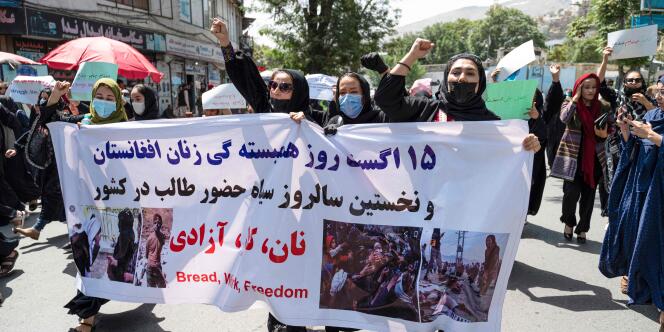
A women’s demonstration for the right to work and education was violently dispersed by the Taliban on Saturday, August 13, a year after Islamists returned to power in Afghanistan.
Forty girls sing “Bread, Work and Freedom” Five minutes after the march began, a group of Taliban fighters marched in front of the Ministry of Education before dispersing them by bursting into flames and firing into the sky. They protested carrying a banner that read “August 15 is a black day”In reference to the date of the Taliban’s capture of Kabul in 2021. “Justice, justice. “We are fed up with ignorance.”They also chanted.
Armed with assault rifles, the Taliban blocked a crossroad in front of the protesters and began firing into the air for long seconds. An Agence France-Presse (AFP) reporter noted that one of them simulated a shooting aimed at the demonstrators.
Some protesters took refuge in nearby shops, where they were chased by the Taliban and hit with shrapnel. They also took away their mobile phones and assaulted the journalists.
Demonstrations for women’s rights have become increasingly rare in the capital, especially after the arrests earlier in the year of the organizers of these rallies, some of whom remained in detention for weeks.
Full veiling is compulsory in public places
Since the Taliban’s return to power in August 2021, fundamentalist Islamists have gradually eroded the freedoms women won in the past two decades since the fall of their previous regime (1996-2001). They have imposed a series of restrictions on civil society, many of which are aimed at subjugating women to their fundamentalist conception of Islam. They have often excluded them from government jobs, restricted their right to travel, and barred girls from middle and high schools.
The latest crackdown dates back to May, when the government issued an executive order approved by the Taliban and Afghanistan’s Supreme Leader Haibatullah Akhundzada. Makes it mandatory for women to wear the full veil in public. The Taliban have made it clear that they prefer the burqa, a combined veil that is often blue and tied at eye level, but other types of veils that reveal only the eyes are tolerated.
The Taliban also felt that unless there was a compelling reason for women to go out, that was it “They better be home”. All these activities “Describing a model of gross gender segregation aimed at rendering women invisible in society”Richard Bennett, the UN Special Rapporteur on human rights in Afghanistan, said in Kabul in May.
Over the past two decades, Afghan women have gained new freedoms, such as returning to school or applying for jobs in all fields, even as the country remains socially conservative.

“Alcohol enthusiast. Twitter ninja. Tv lover. Falls down a lot. Hipster-friendly coffee geek.”
